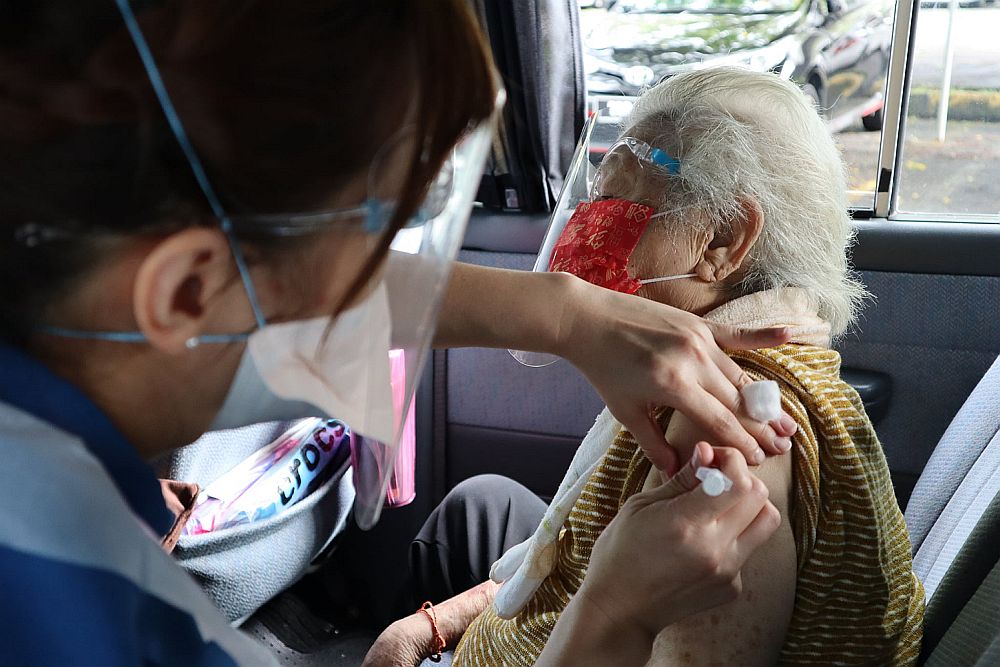KUALA LUMPUR, Sept 15 — The federal government’s Covid-19 vaccine committee has authorised administering third doses to double-vaccinated adults, starting with unhealthy senior citizens and people with compromised immune systems.
The Special Committee on Ensuring Access to Covid-19 Vaccine Supply (JKJAV) plans to roll out booster vaccination programmes first for high-risk groups in states that have fully inoculated more than 80 per cent of their adult population.
To date, only the Klang Valley, Negeri Sembilan, Labuan, and Sarawak have passed that threshold, all of which rolled out double-dose vaccine regimens: Pfizer-BioNTech, AstraZeneca-Oxford, and Sinovac. The single-dose CanSino vaccine has so far only been deployed in Sabah, Perak, Kedah, and Kelantan.
Based on JKJAV documents sighted by CodeBlue, additional Covid-19 vaccine doses will be prioritised for these high-risk groups:
- individuals with weak immune systems;
- adults aged 60 years and older with underlying health conditions;
- individuals who stay and work in long-term care facilities;
- frontline health care workers who are at high-risk of infection;
- people previously infected with Covid-19 who completed inoculation in the first phase of the National Covid-19 Immunisation Programme (PICK).
The second priority group for booster shots comprises individuals aged 18 to 59 with comorbidities who are at high risk of getting re-infected with the coronavirus, as well as other frontline workers.
JKJAV is recommending that booster jabs — either Pfizer or AstraZeneca — for these two priority groups be administered between six and eight months after completing vaccination. It is not immediately clear if the booster campaign allows heterologous vaccination, where individuals can get an additional jab of a different vaccine brand from the first two doses received.
It is uncertain why the government is now authorising booster shots, as the Ministry of Health (MOH) has never sounded the alarm on vaccine breakthrough cases and repeatedly maintained that most infections are detected in unvaccinated individuals.
Based on official data collated by CodeBlue, breakthrough infections in fully vaccinated people increased in Malaysia from 12.6 per cent of total Covid-19 cases reported on August 12 to 35.1 per cent on September 8. MOH reported more than 5,000 fully vaccinated Covid-19 cases daily since August 31, but stopped releasing data on breakthrough infections on September 9. However, raw data on the vaccination status of people who died from Covid-19 is available on MOH’s database on GitHub.
The Covid-19 Vaccine Candidate Selection Committee (JKPCV) is currently evaluating scientific data on the need to give healthy individuals booster jabs, as available data is limited. The decision on the type of Covid-19 vaccine boosters approved for these people will be finalised after more data is obtained.
“The necessity of booster doses for purposes like going on the Hajj, umrah, studying abroad, and other reasons will be evaluated in line with policies and recommendations of the relevant countries,” JKJAV said in its document.
“A special expert panel committee at the national level has been formed to draft a plan and strategy for booster vaccination, led by the director of MOH’s disease control division. This committee is also responsible for drafting guidelines related to booster doses in Malaysia.”
CodeBlue reported Sarawak Covid-19 Vaccine Advisory Group (Scovag) chairman Dr Andrew Kiyu as saying at a webinar last Thursday that Scovag has recommended to the state government to offer third coronavirus vaccine doses — Pfizer — to the elderly and immunocompromised people.
He expressed deep concern about the effectiveness of Sinovac, which comprises 80 per cent of Covid-19 vaccine doses administered in Sarawak, as the country’s largest state suffers a surge of coronavirus infections and rising hospitalisation rates.
A few countries, such as Israel and the United States, have begun rolling out booster campaigns amid rising breakthrough cases linked to waning immunity. Israel has already offered third shots to everyone above the age of 30 to curb a spike of Covid-19 cases, including serious infections, while America plans to start its booster vaccination programme for all adults on September 20. The United Kingdom is due to start its booster programme next week, offering third jabs to frontline health workers and adults aged over 50 or the clinically vulnerable.
Some top scientists, including from the US Food and Drug Administration (FDA) and from the World Health Organization (WHO), however, wrote in The Lancet medical journal that despite the highly contagious Delta variant, “booster doses for the general population are not appropriate at this stage in the pandemic”. The WHO previously pleaded for a moratorium on third jabs amid global vaccine inequity, as millions of people in poor countries have not yet received their first Covid-19 shot.








